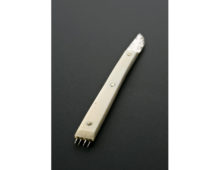Tagged with Objects
Resource : Weir smallpox vaccinator
In the 1700s smallpox was probably the single most lethal disease in Britain – especially among children. But in 1796 Edward Jenner made a discovery that would eradicate the disease and lead to a revolution in public health – it would become known as vaccination.
He noticed that dairymaids who caught a minor disease called cowpox, from infected cows, seemed immune to smallpox – a common but much more serious disease.
Resource : The factory child’s trouble – sampler
This is a sampler that records the sufferings of a child, working in one of the many textile mills in Salford (Greater Manchester). It was sewn by Elizabeth Hodgates who was 12 years old in 1833 and reminds us of the terrible working conditions for children, women and men during the industrial revolution.
Resource : Boulton & Watt engine
James Watt’s ingenious improvements to the steam engine transformed this relatively simple technology, making it more efficient and adapting it so it could be used to turn wheels. His ideas revolutionised steam power, literally driving the industrial revolution and transforming the British landscape and the lives of its people.
Resource : Koenig and Bauer’s steam powered printing press
The industrial printing press was one of the most influential inventions of the Age of Revolution. It allowed thousands of copies of all types of written texts and images to be printed quickly and cheaply. Pamphlets, newspapers, handbills and books could now be mass produced and distributed, spreading news, ideas, political and social campaigns, propaganda, stories, poetry and more.
Resource : The Velocipede
Invented 200 years ago, the humble bicycle is one of the most popular and enduring innovations of all time. Relatively cheap and simple to produce, environmentally sound, easy and fun to use, great for keeping fit and available to people of all ages and from all walks of life, it is still a significant part of our lives today.
Resource : Tokens given by mothers to their children on leaving them at the Foundling Hospital
This is a selection of tokens from mothers who, unable to keep their babies, left them at the Foundling Hospital in London. They highlight the plight of single mothers and destitute families unable to care for their children and are a poignant reminder of the growing poverty crisis as cities became more heavily industrialised and workers more mobile during the Age of Revolution. Many babies were left anonymously by their mothers, along with a token to identify them, in the hope that they might be reunited in the future.
Resource : Luddite ticket
In the early 1700s, work in the textile industry was mainly hand-operated and undertaken by people skilled in crafts – such as weaving and knitting. But innovations in steam power and the design of machinery in the late 18th and early 19th century transformed manufacturing and the way people worked. Much of the new labour could be undertaken by unskilled workers in factories away from the household, quicker than ever before and for a fraction of the price. Skilled textile workers, who found their livelihoods threatened by new, labour-saving technology, responded witha series of violent protests. They became known as the Luddites.
Resource : The Pussyhat
The Pussyhat project is a social movement focused on raising awareness about women’s issues and advancing human rights. Propelled by social media – a revolution in communications – the pussyhat has rapidly become an international symbol for women’s rights, political resistance and collective action.
Resource : Chloroform Inhaler
Today it’s hard to imagine having an operation with no pain relief. But before the 1840s, major procedures such as amputating a leg were done without anaesthetics.
Resource : ‘No Stamp Act’ teapot
In the 1700s, a large area of North America was controlled and governed by Britain. In 1765, the British government changed the tax rules for the people living in these American colonies. Large numbers of colonial Americans refused to pay these taxes, complaining they had no representation in the British Parliament and therefore no say over decisions made about their lives. A period of unrest followed which escalated into the American Revolution and the birth of the USA.


